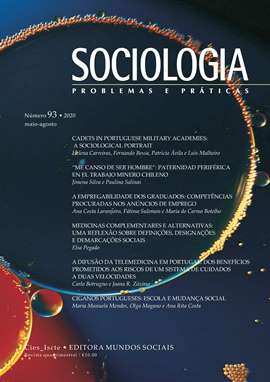La diffusion de la télémédecine au Portugal: des avantages promis aux risques d’un système médical à deux vitesses
DOI :
https://doi.org/10.7458/SPP20209312257Mots-clés :
télémédecine, télésurveillance, technologies de l’information et de la communication dans le domaine de la santé, santé en ligne, inégalités dans le domaine de la santéRésumé
Le premier objectif de cet article est d’analyser la politique de mise en place de la télémédecine, à la lumière des répercussions que sa diffusion peut avoir, non seulement sur la pratique médicale quotidienne, mais aussi sur l’organisation du système national de santé (SNS) en général. L’analyse se base sur des données secondaires obtenues à partir de textes réglementaires et de rapports publiés par le Ministère de la Santé et par la Commission européenne, dans le domaine spécifique de l’e-Health, mais aussi dans le domaine plus vaste de l’innovation technologique dans la santé. Après avoir évalué les principaux axes de la stratégie publique de promotion de la télémédecine, l’article souligne la nécessité de porter un regard critique à la diffusion des services à distance dans la pratique médicale, afin d’éviter les répercussions négatives, parmi lesquelles l’augmentation de la tendance à la privatisation des services de santé et l’aggravation des inégalités, avec le risque de créer un système de santé “à deux vitesses”.
Téléchargements
Publiée
Numéro
Rubrique
Licence
Authors who publish in this Journal must agree the following terms and conditions:
- Authors retain copyright and grant the Journal the right to first publication, while simultaneously agreeing to a Creative Commons Attribution License, which allows others to share their work on condition that they cite the original author(s) and recognise that the latter’s work was first published in this Journal.
- Authors are authorised to enter into additional contracts separately, for non-exclusive distribution of the version of the work that is published in this Journal (e.g. publication in an institutional repository or as a book chapter), subject to recognition of initial publication in this Journal.



